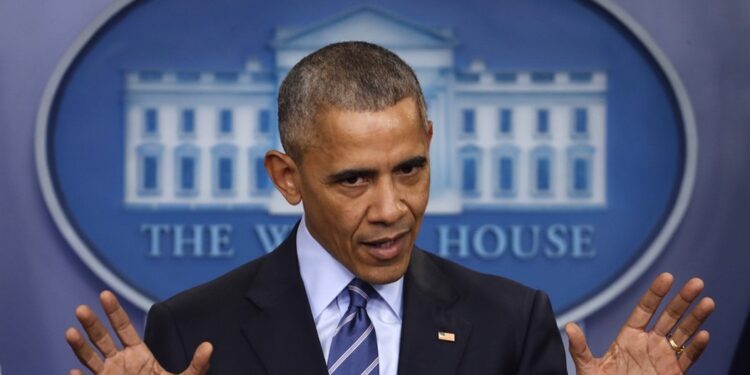Like many, I once saw Barack Obama as a gifted communicator — even if I disagreed with the direction he steered the country. His 2004 DNC speech was undeniably compelling. But time and scrutiny have a way of sharpening perspective. What once appeared polished now reveals the unmistakable signs of a carefully managed message — and perhaps, selective storytelling.
Take a closer look at a revealing moment from his post-election NPR interview in December 2016. At first glance, it seemed routine — a president reflecting on a contentious election. But now, with the benefit of hindsight and mounting declassified material, Obama’s remarks read more like a well-orchestrated pivot.
Let’s lay out the timeline — one the media rarely stitches together:
By August 3, 2016, Obama had already been briefed on a Clinton campaign plan to smear Donald Trump with allegations of Russian ties. We know this from handwritten notes by then-CIA Director John Brennan. The briefing included top officials: the president, vice president, FBI Director Comey, DNI Clapper, and others.
By September 12, an Intelligence Community Assessment (ICA) acknowledged Russian meddling — but focused only on undermining voter confidence. There was no claim of preference for Trump, and intelligence agencies had low confidence in any linkage between Russia and leaked Clinton emails.
Even up to December 9, the President’s Daily Brief included no formal conclusion that Russia favored Trump. Yet that very day, Obama met with senior officials and instructed the intelligence community to compile a new ICA — fast. That same day, headlines in major outlets like The Washington Post and The New York Times shifted sharply. Suddenly, anonymous sources claimed Russia actively helped Trump. But again — the official assessment hadn’t even been written yet.
Then came Obama’s NPR interview on December 16.
When asked if Russian interference affected the election, he said:
“There’s no doubt that it contributed to an atmosphere in which the only focus for weeks at a time, months at a time, were Hillary’s e-mails, the Clinton Foundation, political gossip surrounding the DNC… I have no doubt that it had some impact just based on the coverage.”
The framing here is subtle but strategic: Clinton’s scandals, rather than being real issues of accountability, are recast as distractions fueled by foreign interference.
Obama goes on to claim:
“So what the CIA is now assessing, which was it was done purposefully to tilt the election in the direction of a particular candidate, shouldn’t be a surprise to anybody.”
There’s just one problem: at that point, no official ICA stating this had been released. The order to draft it had only been given a week prior. The finished product wouldn’t come out until January 6, 2017.
So how did he already know the CIA’s conclusion — unless the outcome had been predetermined? His language didn’t just preview the conclusion. It asserted it, on the record, before the report was finalized.
And it gets worse. After the interview wrapped, Obama came back into the room to revise his earlier comments:
“There are still a whole range of assessments taking place among the agencies.”
“Right now what you’ve had are CIA leaks, not of an official document.”
Cleanup on Aisle Obama.
This quiet backtrack confirms what had become obvious: his earlier certainty wasn’t based on a finished intelligence product. It was based on politically convenient leaks — leaks that just happened to align perfectly with a narrative already taking shape in the media.
Later, when the final ICA was released in January, it confirmed:
- “Putin and the Russian Government developed a clear preference for President-elect Trump.”
- “Aspired to help Trump’s election chances… by discrediting Clinton.”
The CIA and FBI claimed “high confidence.” The NSA was only willing to say “moderate confidence.”
In other words, the conclusion wasn’t unanimous. But the political use of that conclusion — well, that part was certainly coordinated.
Looking back, Obama’s demeanor during the interview speaks volumes. Careful, cautious, calculated — not the usual easy confidence. Not nervous, but clearly trying to shape how history would record the moment. And crucially, avoiding outright accusations of Trump-Russia “collusion” — that phase of the operation would unfold later.
It all hints at something bigger: not just a president speaking off-the-cuff, but one laying early groundwork for a narrative that would later consume headlines, launch investigations, and distract the country for years.
We now know that Russiagate didn’t begin with facts. It began with framing — and some of that framing was publicly rehearsed, right from the top.
Obama may have thought he was getting ahead of the story. Instead, he may have left behind something far more telling: a rare, unscripted glimpse at the machinery of political narrative-building in real time.
And perhaps, not so much a skilled communicator — as a careful orchestrator of perception.





















This is a very good article! Just loved the clean up on aisle Obama! It’s truly what he was doing, taking precautions to ensure the message gets the mockingbird MSM treatment! Just because there was two very strong leaders that wanted stop the cabal operations, they targeted them both! It’s because of Obama and Hillary that the corruption started in the first place. Good story!!